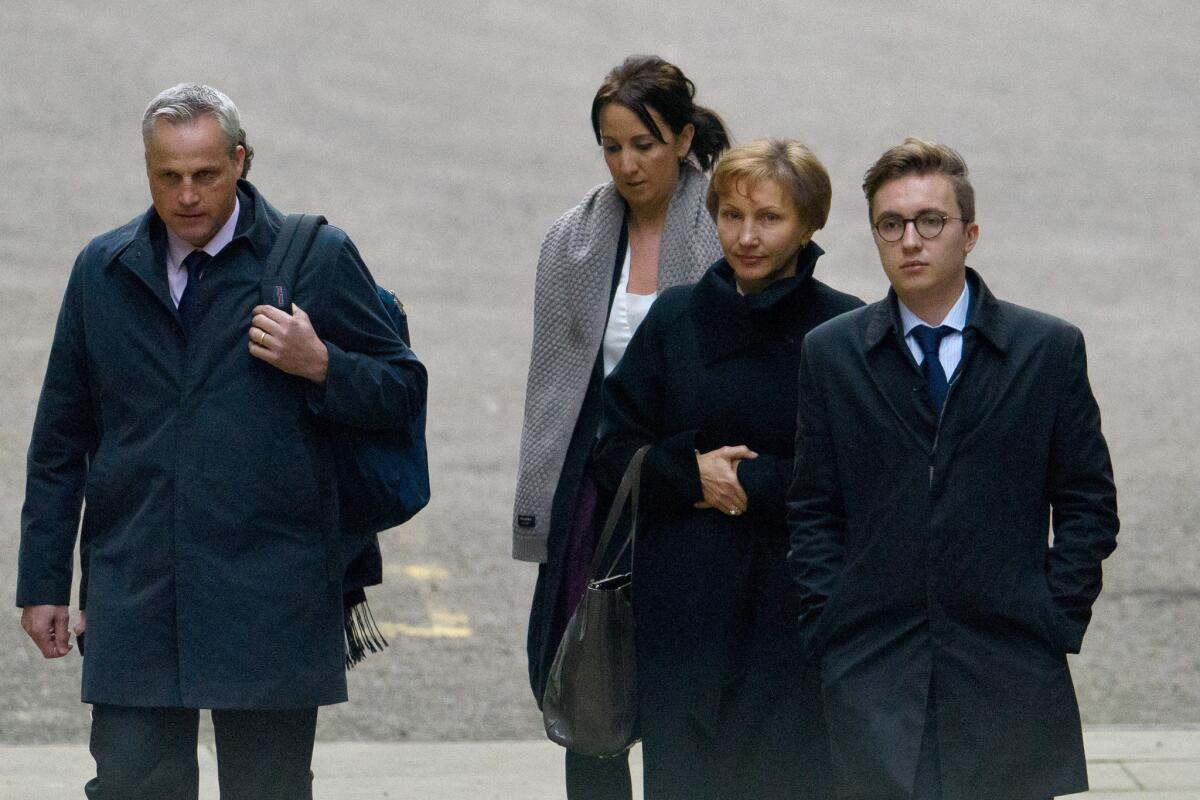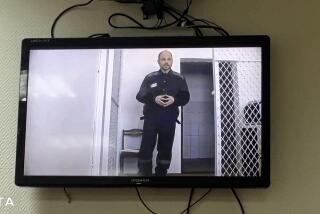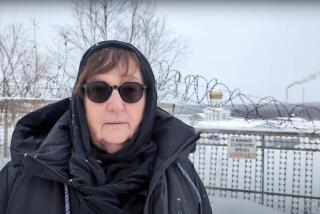British inquiry finds Putin probably OKd ex-spy Litvinenko’s poisoning

Alexander Litvinenko’s widow, Marina, center right, and son Anatoly, right, arrive at the High Court in London to receive the results of the inquiry into the former agent’s death.
- Share via
reporting from LONDON — For 10 years, she has carried on a crusade for justice, determined to see the Russian government held responsible for the agonizing death of her husband, former spy Alexander Litvinenko.
On Thursday, Marina Litvinenko choked back tears after hearing a British judge rule that Russian President Vladimir Putin “probably approved” a scheme to poison her husband with radioactive polonium-210, which was slipped into his green tea during a meeting in London with two Russian agents.
Sir Robert Owen issued his 300-page report after hearing from 62 witnesses over six months and reviewing secret intelligence reports about Alexander Litvinenko’s interactions with British intelligence.
The report offers several possible motives for the killing, including Litvinenko’s open criticism of Russia’s security agency, the FSB; his work for Britain and his close ties to leading Putin opponents such as Boris Berezovsky.
Litvinenko sought asylum in Britain in 2000 and proceeded to make a series of very personal attacks on Putin as well as damning accusations against the Russian government and the FSB.
Among them, he accused Putin in 2006 of pedophilia, allegations that the Kremlin strenuously denies. His poisoning occurred later that year. He was 43 when he died.
“There was undoubtedly a personal dimension to the antagonism between Mr. Litvinenko on the one hand and President Putin on the other,” Owen’s report says.
As he lay dying, Litvinenko had blamed Putin for his poisoning. “You may succeed in silencing one man, but the howl of protest from around the world will reverberate, Mr. Putin, in your ears for the rest of your life,” he had said.
Speaking outside the High Court in London on Thursday, his widow said she was “very pleased that the words my husband spoke on his deathbed when he accused Mr. Putin of his murder have been proved true in an English court with a high standard of independence and fairness.”
She called on British Prime Minister David Cameron to impose economic sanctions and travel bans on the Russian leader.
“It is unthinkable that the prime minister would do nothing in the face of the damning findings of Sir Robert Owen,” she added.
Speaking later at a news conference, she appeared tearful as she gave thanks to her legal team, the police, prosecutors and her son, Anatoly.
My son “was only 12 when his father died and it was not easy for him to step forward and start to talk to the press,” she said.
She added that she was aware of the pressure she was putting on the prime minister and his government by asking them to impose sanctions on Putin and others who were implicated in her husband’s death.
“Of course we do understand what we are asking from David Cameron,” she said, adding that the easiest option would be to just “ignore what Putin had done already.”
Anatoly Litvinenko spoke briefly to say that life had been “pretty difficult” since his father’s death.
“I mean, it’s the only life I live and sure, it hasn’t been easy but … I can’t compare it with anyone else’s life,” he said.
Alexander Litvinenko is believed to have been given tea laced with the poison during a meeting with Russian agents Andrei Lugovoy and Dmitry Kovtun at the Millennium Hotel in central London.
The report says there was a strong likelihood they were acting on behalf of the FSB and Putin probably signed off on the action.
British Home Secretary Theresa May said she welcomed the inquiry’s finding, describing the report as “detailed, thorough and impartial.”
She said the government was carefully reviewing the report’s findings, which she called “deeply disturbing,” and announced that international arrest warrants remained in place for Lugovoy and Kovtun. Britain was imposing asset freezes on the pair, she said.
“This was a blatant and unacceptable breach of the most fundamental tenets of international law and of civilized behavior,” May said.
A now-familiar photo of the former spy shortly before his death, looking gaunt and wearing a hospital gown, circulated around the world and brought global attention to the story.
Russian Ambassador Alexander Vladimirovich Yakovenko was summoned to Britain’s Foreign Office on Thursday afternoon to meet the minister responsible for Russia, David Lidington.
The British Foreign Office called the findings of the inquiry “deeply disturbing,” adding that the probable involvement of the Russian state demonstrated a “flagrant disregard for U.K. law, international law and standards of conduct, and the safety of U.K. citizens.”
Lidington reiterated Britain’s demand that Russia hand over the suspects, the Foreign Office said in a statement.
Putin’s spokesman, Dmitry Peskov, dismissed the British inquiry as a “quasi-investigation” and said the Kremlin does not regard its findings as a verdict in the case. He cited “the fact that a public inquiry is based on classified data of special services, unnamed special services, and that the verdict based on this ephemeral data is brought with the abundant use of the words ‘possibly’ and ‘probably,’” the Russian news agency Tass reported.
The case led to a major diplomatic fight between Russia and Britain. Diplomats were expelled from Britain and security and intelligence cooperation between the two countries was suspended as the Kremlin was accused of masterminding the killing.
Lugovoy said the accusations against him are “absurd,” according to Reuters.
A statement from Russia’s Foreign Ministry said the case had been “politicized,” adding, “There was no reason to expect it to be objective and unbiased.”
Marina Litvinenko expressed relief that she could now conclusively say she knew who killed her husband, even if they were not behind bars.
“There was a lot of speculation that they might [have done] this,” she said, referring to Lugovoy and Kovtun. “Today they received a verdict and it [said] yes, these two guys definitely committed this crime.”
“Yes, they are walking in the streets of Moscow,” she added, “but ... I believe final justice when these two people will be punished will happen.”
Boyle is a special correspondent. Times staff writer Alexandra Zavis in Los Angeles contributed to this report.
ALSO
Survey of U.S. companies in China shows not all’s well
Why markets are anxious about Iran’s reentry into the global economy
Utilities push a solar pricing proposal they say is fairer for non-solar users
More to Read
Sign up for Essential California
The most important California stories and recommendations in your inbox every morning.
You may occasionally receive promotional content from the Los Angeles Times.













